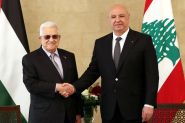- Home
- Multimedia
- Faisal bin Farhan from Baabda: A Strong and Unwavering Support for Joseph Aoun
In a significant diplomatic move, Saudi Foreign Minister Faisal bin Farhan Al Saud concluded his visit to Baabda, where he met with newly elected President Joseph Aoun. This visit marks a historic moment, as it is the first time in 15 years that a high-ranking Saudi diplomat has visited Beirut.
During the visit, Minister bin Farhan reiterated Saudi Arabia’s unwavering support for President Aoun and emphasized the importance of strengthening ties between the two nations. The discussions focused on enhancing political, economic, and security cooperation, signaling a renewed commitment to Lebanon's stability and future.
This visit underscores ongoing efforts to rebuild Lebanon’s relations with key Arab states, particularly as the country faces significant political and economic challenges.
Throughout his visit, Minister bin Farhan is also meeting with Prime Minister-designate Nawaf Salam, Parliament Speaker Nabih Berri, and caretaker Prime Minister Najib Mikati.
What the Visit Represents
Prince Faisal's visit to Beirut is viewed as a friendly overture, signaling that Saudi Arabia is keen to build stronger ties with Lebanon. Riyadh’s re-engagement may also encourage other Arab nations to play a more active role in Lebanon’s recovery.
Observers see the visit as a potential turning point in relations, reinforcing Saudi Arabia’s role as a key player in regional geopolitics. While immediate results are not expected, the visit itself represents a significant step toward rebuilding trust and cooperation between the two nations.
Prince Faisal: A Seasoned Diplomat
Prince Faisal bin Farhan, who has served as Saudi Arabia’s foreign minister since 2019, is a key figure in shaping the kingdom’s evolving foreign policy. His tenure is seen as pragmatic, focusing on economic diversification and modernization in line with Saudi Arabia’s Vision 2030.
Born in 1974, Prince Faisal studied management and international politics, laying the foundation for his distinguished career. Before becoming foreign minister, he served as Saudi Arabia’s ambassador to Germany and held key advisory positions within the Ministry of Foreign Affairs. His extensive experience in navigating complex international relations has made him a trusted figure in managing sensitive diplomatic engagements.
What Lebanon Hopes to Gain
For Lebanon, this visit brings a glimmer of hope amid its ongoing crises. The country’s dire economic situation, compounded by political stagnation and the aftermath of recent conflicts, has left its citizens in urgent need of international support. Saudi Arabia’s involvement could unlock opportunities for aid, investment, and collaboration on key reforms. While the symbolic importance of the visit is significant, Lebanon’s path to recovery will depend on concrete financial assistance and political backing to address the many challenges it faces.
Read more





Comments